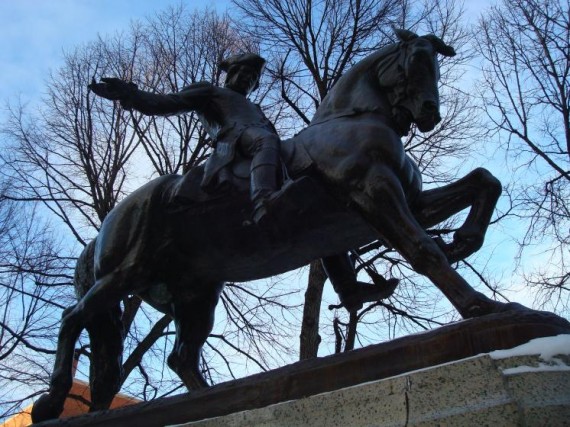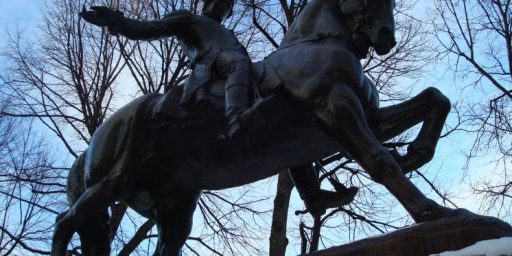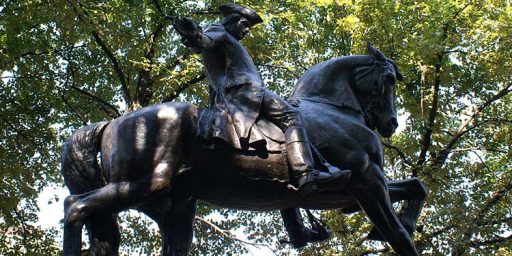One More on Palin and Revere’s Ride (and Back to the Politics of History)
Two things: 1) one of the best things I have seen on this topic and 2) and a re-iteration on what I think is the broader issue here.
 Yes, I know we are all sick of this (or, at least, we say we are—if we were really sick of it, we would neither blog about it or comment on said blog posts), but I think that the following from the Corner is one of the clearest, and best, written pieces about the Palin/Revere bit.
Yes, I know we are all sick of this (or, at least, we say we are—if we were really sick of it, we would neither blog about it or comment on said blog posts), but I think that the following from the Corner is one of the clearest, and best, written pieces about the Palin/Revere bit.
And it is a piece that has credibility, insofar as the author a) wrote a book on Revere, and b) strikes me as having pretty strong conservative cred (as he is writing on NRO and works for Thomas Nelson Publishing).
So, I give you, Joel J. Miller: What Sarah Palin Got Wrong — And We Did, Too.
His basic position on what Palin got wrong:
As the author of a book about Revere’s life, when I heard this, I groaned. From Revere’s own account, it’s clear that he didn’t fire a shot, he didn’t ring a bell, and he didn’t intend to warn the British of anything (unless you count the townsfolk as British, which they technically were for a little while longer).
The unarmed Revere left Boston in total silence. He muffled the oars of his boat as men rowed him to Charlestown, and he rode in silence after leaving Charlestown by horseback. He was, after all, on a secret mission to alert John Hancock and Samuel Adams in Lexington that they were in danger.
Only after scaring up two redcoats on horseback and turning away to Medford did he begin waking the countryside. He first woke the militia captain in Medford and then rode to Lexington raising the alarm — by shouting, mind you, not shooting or ringing bells.
In short, Palin basically got the whole story wrong.
This should be perfectly clear (although I expect argumentative responses nonetheless).
His view on what others got wrong:
But then there’s us, we who revel in the cheap shot and the takedown. People make mistakes. People say cockamamie things. But high-vaulting and jumping down their throats is rarely called for. Still, we’ve cultivated a whole media culture of such acrobatics. That is also prideful and unattractive.
All fair enough, although as he also said:
Palin should have been humble and admitted she got the story wrong. She could have spun it to say that she got the spirit of the thing right. She could have done a lot of things. But persisting in a flashing-neon error as she’s done is prideful, and that kind of pigheadedness is very unattractive in someone vying for public office. Sarah’s sin was in her lack of humility.
This, too, is fair. Ultimately, Palin opponents can be criticized for piling on, but really, the attempt to explain away Palin’s statement as being accurate is simply problematic (and not really worth the energy of the defense, I would argue). Why Palin appear unwilling to ever admit she was wrong is a mystery, as it if done properly, could probably be an advantage to her.
For my own part, my reason for writing about the statement was not as a “gotcha,” although I did find the “ringing those bells” bit to be rather amusing* but rather because I thought it fit a broader pattern. I never even bothered with the “warn the British” part, as I figured that what she meant (in a convoluted way, granted) was that Revere’s ride would mobilize the colonists, and that uprising would be a warning to the British government.
I still think, as I noted in my original post on the subject, that the more significant issue here is the ongoing appropriation (and recasting) of American history to validate contemporary views (and I cited or linked several examples beyond just Revere**). In that light, the assertion about how the “they weren’t gonna be takin’ away our arms” is a statement that sounds, to a contemporary ear, like the seizure of personal weapons. Now, it may well be that Palin was referring to the threat to weapons stored at an armory, but I have my doubts. There is a prevailing myth that is a favorite of the Tea Party faction that the Second Amendment exists to protect the citizens from the government.*** This view is often linked to the notion that it was because we had armed civilians in the colonial era that it was possible for the colonists to win independence from the British. Without getting into question of whether that interpretation of history is correct, it strikes me as far more likely that that view is what Palin was trying to tap into in her statement.
At any rate, I think that the broader story here is the misapplication of history to try to score political points.
I do recognize, by the way, that this is a time-honored tradition in American politics, and not one that I expect to go away soon. I do, however, think that it has reached as especially problematic level in the Tea Party faction of the GOP at the moment, as is often seems that appeals to an imagined past are far more central to their rhetoric than are real policy ideas.
____
*And, really, I am not sure how anyone could not find that part amusing.
**I noted two different Palin quotes about the Statue of Liberty, a link to Sharron Angle’s views on the Second Amendment, a link and a quote regarding a Tea Party candidate from a congressional race in Alabama and his problematic appropriation of American history, as well as a discussion of the Tea Party label itself.
***And yes, the word “myth” is both purposeful and accurate.






Yeah, that’s why I linked to Revere’s account in a previous post of yours. You’d think that a primary source might be a good place to start but apparently not.
@Dave:
Indeed. In fact, after you posted that link I re-posted it in the thread of the longer post, but I don’t think anyone read it (indeed, several commenters later quoted it to back to me like I had never heard of it).
To be honest I think this ridiculous discussion is mostly a question of team spirit but hinges upon a distinction that seems to be lost on most people. It is possible to be right accidentally in detail but wrong in substance.
@Steven:
Can you think of any culture that doesn’t engage in this sort of tactical interpretation? It seems to me that this is a tradition that goes well beyond American politics and extends to the heart of all history (or historiography) including religion…
For example, Foucault (I realize that’s a problematic name among many American Historians) compellingly argues that the French aristocrat Boulaivilliers history of France was written to emphasize the legitimacy of Lords and Nobles, and in doing so, weaken the role of the King.
Goin back further, one could argue that following the Constantine’s conversion to Christianity (and with him the Roman empire) that the New Testaments were “reinterpreted” to downplay the role of the Romans in the death of Christ and emphasize the role of the Jews.
@Matt:
I concur. I was not meaning to be exclusive by citing “American politics” but simply said that because it is the context in which Palin is acting (and what most commenters are likely to be focused on).
Indeed, a wonderful non-US and contemporary example off the top of my head: Netanyahu and the “Judea and Samaria” routine about the West Bank.
excellent…now we have palin as a rural american version of foucault. my day is complete.
i’m waiting for jwest to claim he knew all about foucault before this…as he (she?) has done with alinsky.
@ Steven
As I recall you lost out on the Statue of Liberty argument. Part of the purpose for the Statue was to remind U.S. citizens to cherish their special form of government of the time.
You sound like one of those who think the Second Amendment has to do with the right to have a military?
@Wayne:
I recall some people arguing that I was wrong about the Statue of Liberty quotes, as people have every right to assert. I however, still maintain my basic position is correct.
In re: the Second Amendment, I reject the notion that the purpose of the amendment is to protect the people from the government. This is a nonsensical position.
the second amendment is not to protect people from the government…it is to protect people from obama.
Colbert reenacting Revere’s ride according to Palin:
http://tpmlivewire.talkingpointsmemo.com/2011/06/colbert-reenacts-reveres-famous-ride-to-prove-palin-right-video.php
Hey now! Don’t be dissin my myths!
As Orwell put it in “Notes on Nationalism”:
Yes, people make mistakes. But this person seems to do it pretty much every time she speaks, and she seems to utterly lack the ability to admit, or even conceive that she is wrong. When discussing such a significant figure on the political landscape, that is a legitimate topic for conversation.
It’s much like the thing about conservative sex scandals. Of course it’s a bigger deal when a self proclaimed leader of the “moral majority” gets caught tapping his feet in an airport bathroom. They made it a bigger deal when they set themselves up as arbiters of morality for everyone else.
So it is with people who demand absolute fidelity to the constitution and then go on to “quote” the constitution as guaranteeing “life liberty and the pursuit of happiness.” Kind of hard to take a person seriously who can’t even get their own, supposedly, dearly held convictions right.
“I reject the notion that the purpose of the amendment is to protect the people from the government. This is a nonsensical position.”
OK, I’ll bite. My opinion of political science PhD’s couldn’t sink any lower, so….
What were the framers of the constitution think of with the second amendment? Were they hunting enthusiasts?
@jwest,
The problem is, of course, that you have shown yourself to be impervious to facts or logic, so what would be the point?
@ratufa, great quote. Dovetail nicely into 1984:
What were the framers of the constitution think of with the second amendment?
Defense against Indians, British, Sasquatch, etc.
As a Portuguese, I am not the best person to have opinions about the meaning of US Constitution.
However, I am sure that the “Bill of Rights” (including the 2nd Amendment) was a concession given to the Anti-Federalists to appease their fears that a central government will become tyranical. In these context, I can’t see how 2nd Amendment can be perceived as anything as a safeguard of the “people” against the “government” (like all BR).
@Miguel:
No time for much of a response at the moment, but some of what I am thinking int terms of can be found here and here.
I do agree that the 2nd Amendment protects citizens from having their guns seized. I just don’t think the idea was that the guns in question were to kept as a bulwark against the government itself.
Make that “to be kept”
A séance with Paul Revere: The Real Truth?
We, a group of four, are gathered around a table, an overturned glass at its center, our hands lightly touching the upended object.
The lights are low. “Hello,” we chant, “we’d like to make a person-to-spirit call to Paul Revere. . .Mr. Revere, if you can hear us, give us a sign.” We are silent. All is silent. Then, slowly, the glass begins to make small circles in the table’s center. . .We feel a presence. . .
The séance continues at the whimsical Thinking Out Loud, http://marperl.blogspot.com/2011/06/seance-with-paul-revere.html
“My opinion of political science PhD’s couldn’t sink any lower…”
I retract this statement. It can and has.
It takes someone with an advanced degree to be this wrong. The comments by Zenpundit at your link echo my argument.
@jwest: Argument? You never make arguments.
Quoting from the relevant portions:
:There is a difference between resisting tyranny and engaging in armed rebellion, I agree. Governments, to paraphrase Madison, were not composed of angels and the Founders understood this. The second Amendment was another one of their many acts of balancing interests and powers.
It was conceivable to them that illegal insurrection could arise from an armed populace but they judged tyranny the greater threat over the long term, which is why there were so many Antifederalists and why the Bill of Rights was added, to peel away the opposition to the Constitution from more moderate antifederalists.”
I can’t imagine what it is you believe the reason for the second amendment was. Please enlighten us.
Speaking of myths,
“There is a prevailing myth that is a favorite of the Tea Party faction that the Second Amendment exists to protect the citizens from the government.***
***And yes, the word “myth” is both purposeful and accurate.”
My question for the good professor is, as a political science professor, have you ever READ the first ten ammendments to the Constitution, aka, the Bill of Rights? I would have thought so. Ever notice anything “funny” about them?
Perhaps I am being misunderstood: I recognize that rights in the Bill of Rights preclude a variety of government actions. As such, they protect citizens from the government.
My point about the Second Amendment is that it was not intended to created an armed citizenry just in case the government became tyrannical and therefore be prepared for an armed insurrection.
It is one thing to say that the citizens have the right to keep and bear arms and therefore they are protected from the government infringing on that right. It is yet another to state that the early Congress was purposefully arming the populace so that they could rebel if needed.
Oh, I get the explanation. So you have read the first 10 ammendments, and you recognize that they’re all designed to protect the citizenry from government becoming … except number 2?
“It is one thing to say that the citizens have the right to keep and bear arms and therefore they are protected from the government infringing on that right.”
That is akin to saying that the earth is round … because it is a sphere.
What you said was, “There is a prevailing myth that is a favorite of the Tea Party faction that the Second Amendment exists to protect the citizens from the government.”
That’s not a myth at all. EVERY ammendment within the Bill of Rights was specifically designed, not to protect the citizenry “in case the government became tyrannical”. They are designed to PREVENT the government from becomming tyrannical in the first place. The final resting place of tyranny is in force of arms. THAT is why the second ammendment exists.
“from becomming … ” should be “from becomming tyrannical””
The Second Amendment does not exist as a means to prepare the citizenry for a potential armed rebellion against the US government just in case it is necessary.
You are entitled to believe otherwise if you wish.
One further point of clarification: I do not think that an armed citizenry prevents tyranny. Not only does the empirical evidence demonstrate this fact, but the notion that a bunch of amateurs armed with the contents of their gun cabinets are a deterrent against the US military (or even the police) is absurd on its face.
However, the notion that the presence of those arms keeps the government from becoming tyrannical is part of the myth I noted in the original post.
“The Second Amendment does not exist as a means to prepare the citizenry for a potential armed rebellion against the US government just in case it is necessary.”
Well, you said it so it must be so! And that, by the way, is a straw man and not what (as far as I have read) anyone here has claimed.
“Not only does the empirical evidence demonstrate this fact, but the notion that a bunch of amateurs armed with the contents of their gun cabinets are a deterrent against the US military (or even the police) is absurd on its face.”
Try to stay on point, Dr. Taylor. That was not the case in the late 18th century. Case in point, Colonists v. Britain.
The problem with your position is that the preponderance of the evidence is on my side, with the primary points being,
Context of the ammendment (within the other 9)
Recognition by Convention of a need for a standing militia (therefore the tyranny risk) – “A well regulated militia being necessary to the security of a free State, the right of the People to keep and bear arms shall not be infringed”. Seems obvious on its face.
By the way, just as a point of interest and personal context – I am not a gun owner. I come at this from the standpoint of personal freedoms and liberty, not as one “clinging to his guns …”.
To paraphrase, “you may believe what you wish”. Thanks for the entertaining exchange!